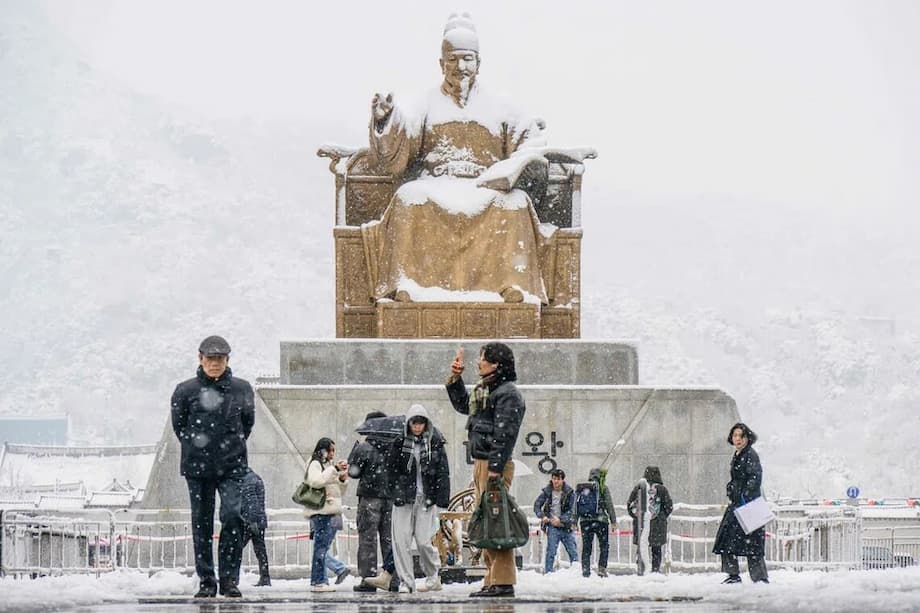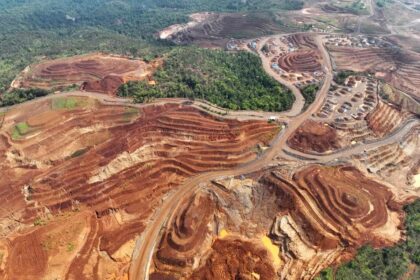A volunteer mission to rebalance how Korea is described online
Search results for South Korea often spotlight K pop, Squid Game, or the nuclear standoff with North Korea. Those subjects captivate global audiences, yet they leave much of Korean history, literature, architecture, and daily life in the shadows. On Wikipedia, the worlds most used reference work, that imbalance can harden into an index of what the world thinks it knows. One volunteer editor, a Korean American who writes under the name Grapesurgeon, has spent years trying to fix that. He says too many Korea related pages are biased, incomplete, or missing. His goal is simple to state and difficult to achieve. He wants the worlds readers to find depth, accuracy, and context when they look up South Korea.
- A volunteer mission to rebalance how Korea is described online
- From pop culture to palace gates, filling gaps in English Wikipedia
- Claims of bias and a push for balance
- Inside Wikipedia editing, limits and the manpower problem
- Safety, anonymity and the politics of editing
- AI writing rules in two Wikipedias
- How newcomers can help and where to start
- Highlights
That gap became personal when he realized how much of Koreas story was being reduced to easy narratives. He describes a pattern of online commentary that mocks ordinary South Koreans or fixates on hot button problems without explaining the historical and geopolitical forces that created them. The effect, in his view, is a distorted picture. Grapesurgeon prefers to let his contributions speak. He is among the most prolific volunteers in Wikipedia history. By edit count, he ranks around 641st worldwide, with close to 130,000 edits across accounts. On the English Wikipedia, there are roughly 42,000 Korea related articles, and he says he has made at least one change on most of them. He has created or substantially expanded hundreds, including major entries on Sejong the Great, the royal palaces Gyeongbokgung and Changdeokgung, the March First Movement, and independence leader Kim Ku. The work is granular and often invisible to casual readers, yet it shapes what millions of people learn about Korea every day.
Who is Grapesurgeon and why his work matters
Born in the United States and raised in South Korea, he edits under a pseudonym for safety and privacy. His interest in Korean studies actually began on Wikipedia itself. Years ago, he stumbled on a weak article about Kim Ku. Trying to fix it drew him into the history behind the page. The deeper he read, the more he saw how many essentials were missing from the English language side of the encyclopedia. He stayed, learning the culture and rules of the volunteer community while tackling topics that get less attention.
His approach is tactical. Articles about social controversies and current politics attract many editors and intense debate. He focuses on subjects that are vital but under covered in English. That includes premodern history, historic sites, and foundational figures. The result is a body of work that gives readers a fuller map of Korean heritage, not just the subjects that trend on YouTube or in entertainment news.
From pop culture to palace gates, filling gaps in English Wikipedia
Wikipedia is strongest where sources and global interest are abundant. For Korea, that often means pop culture, the Korean War, North Korea, and modern social issues. Many other topics lag behind. Basic pages on key rulers, cities, or literary traditions can be thin, dated, or poorly sourced. The imbalance is not deliberate. It reflects how volunteer attention and English language sourcing cluster around certain subjects. When few editors read Korean and fewer still have the time to translate or synthesize academic work, nuanced history loses out.
That does not mean readers ignore those pages when they get better. One surprising example came from a quiet article he wrote on ddakji, a traditional Korean game played with folded paper tiles. After the game appeared in the global hit Squid Game, page views surged to around 350,000. Interest spiked each time a new season arrived. The episode shows how a patient edit on a niche cultural subject can suddenly meet a global audience, provided the content is there when curiosity strikes.
Why a Renaissance king became his flagship project
Among his many pages, the article on Sejong the Great stands out. Sejong reigned from 1418 to 1450 and is credited with commissioning the Korean alphabet, Hangul, along with advances in science, governance, and culture. In English, comprehensive work on his reign is limited, scattered across academic journals and specialized books. Grapesurgeon spent years gathering every English language source he could find and translating key material from Korean. The result is one of the most detailed public resources on Sejong available in English. He calls that article his proudest contribution because it puts authoritative, readable material into a free reference that anyone can access.
He says the pride comes not from ownership, which Wikipedia does not allow, but from opening access. In his words, he wanted to make scholarship that would otherwise stay buried behind paywalls or language barriers accessible to a high school student in Manila, a college freshman in Nairobi, or a curious reader in Manchester.
Speaking about that project, the editor recalled countless hours spent sifting through books and papers and translating passages that had never appeared in English. He framed the effort in simple terms.
After describing the effort to build the Sejong article, the editor summed up his motivation.
I am proud to have made all of this available to the public for free.
Claims of bias and a push for balance
He is blunt about what he sees as skewed coverage and commentary surrounding South Korea. In his view, online narratives often fixate on social stress points and then treat them as a national summary. The punchlines can be cruel. They erase context, including colonial history, war, division, and the economic and security pressures that shaped modern life on the peninsula. That tendency is not unique to South Korea. It affects many countries that are often seen from afar through a handful of stories.
In conversation, he objected most strongly to ridicule aimed at ordinary people for structural problems. He explained his view of who bears responsibility for complex challenges.
Average people do not deserve to be mocked for problems they did not create.
Wikipedia aims for neutrality, but it is built by volunteers who can only cite what reliable sources have published. Where English language sources are sparse or uneven, coverage tends to be thin or skewed. Korean language sources can help, yet many English readers and editors cannot access them. That is where translators and bilingual volunteers can play an outsize role. Even simple tasks like adding missing citations or a paragraph that summarizes a key historical study can change the quality of a page.
Inside Wikipedia editing, limits and the manpower problem
The scale of the challenge is stark. On the English Wikipedia there are roughly 42,000 articles related to Korea. Excluding pop culture and North Korea, he estimates there are fewer than ten regular editors who focus on this set of topics, and only a portion of them speak Korean. That leaves a small group trying to maintain, source, and expand thousands of pages while handling routine cleanup, vandalism, and policy discussions.
Several mechanics of Wikipedia make the work both rigorous and slow. Editors cannot publish personal opinions or new analysis. Every claim needs to be backed by reliable sources. Notability rules determine whether a topic merits its own article. These guardrails protect quality, yet they also mean that gaps in English language scholarship become gaps on Wikipedia. Translating from Korean helps, but translation must be careful and verifiable. He encourages editors to use Korean language sources, while noting that English sources improve accessibility for the broadest audience.
How readers and AI models rely on what is there
Wikipedia reaches far beyond casual browsing. Search engines summarize its content. Digital assistants repeat it. Large language models train on it and use it through retrieval. When an article is wrong, shallow, or missing, the consequences ripple into classrooms, newsrooms, and software used by millions. The editor explained this point plainly, arguing that better pages about South Korea strengthen public understanding at scale.
Directly and indirectly, a huge portion of the world learns about Korea through Wikipedia.
That is why he treats sourcing as central to his mission. A careful citation added to a history page today can land in a thousand future conversations through search, AI answers, and social media. The influence is invisible to most readers, yet the downstream effect is real.
Safety, anonymity and the politics of editing
Grapesurgeon mostly avoids the most heated political topics. He still edits under a pseudonym. He worries about the growing risks facing volunteers who write about sensitive subjects. Governments are expanding surveillance and control. Social media is harsher and faster. What is acceptable today can become taboo tomorrow. Those shifting lines create uncertainty for editors who sign their real names to contentious pages.
He summarized the headwinds in a few words.
It is becoming less safe to edit Wikipedia.
Concerns about safety are not hypothetical. Wikipedia editors around the world have faced doxing and harassment, and in some cases legal threats. The platform relies on openness and transparency, but it also allows pseudonyms to protect contributors. Volunteers choose their own risk tolerance. For some, a pen name makes difficult work possible.
AI writing rules in two Wikipedias
The editor advises caution with AI generated text on the English Wikipedia. Community norms there are skeptical of machine written prose. Sloppy use of AI in discussions can even be prohibited. Editors are expected to use their own words, to quote sources precisely, and to verify claims. That culture protects quality and traceability. It also reflects the reality that AI can hallucinate facts or misstate sources.
The Korean Wikipedia has shown more openness to assistive technology. An example is WikiVault, a tool introduced on April 25, 2025 that combines machine translation, research support, and article drafting. It is an opt in feature for registered users. WikiVault helps translate from English into Korean while addressing issues like template differences and awkward phrasing in honorifics. For writing assistance, the tool proposes text based on sources a user approves, and it formats citations. It also uses Wikidata for titles and supports mobile workflows. The software relies on a large language model, gemini 2.5 flash, and it was built to assist, not replace, editors. A page about WikiVault recorded community feedback that was mostly positive, alongside bug reports and improvements. Interested editors can explore the tool and its documentation on the Korean Wikipedia here.
How newcomers can help and where to start
South Korea has thousands of Wikipedia pages that need better sourcing, clearer prose, and fresh summaries of published research. Grapesurgeon argues that new editors can make a difference in days, not years, if they start with the basics. He points people to WikiProject Korea, a community forum where volunteers organize tasks, review drafts, and trade advice. The first step is to choose a manageable corner of the map and learn by doing.
Practical tips from a veteran editor
His advice is pragmatic and built from long experience. He favors steady, careful contributions that follow the rules and respect other volunteers. He also stresses that disagreements are normal and even productive when everyone cites sources and talks in good faith. For those willing to try, here are habits he recommends.
- Start small. Fix a paragraph or a section before attempting a complete rewrite. Learn how citations and templates work.
- Avoid the most controversial articles until you are comfortable with policies and talk page discussion.
- Be patient and collegial. Content disputes are part of the design. Use talk pages, provide sources, and assume good faith.
- Cite every claim to a reliable source. Keep personal opinions out of articles.
- Use Korean language sources when they are reliable and relevant. Provide English sources when possible to increase accessibility.
- Use AI carefully. Do not paste machine written text into English Wikipedia articles. If you use tools for research, always verify and rewrite in your own words.
- Join WikiProject Korea to find tasks and mentors.
The long term fix for coverage gaps is not a handful of super editors. It is a larger group of contributors who can read Korean sources, summarize them well, and build articles that stand up to scrutiny. Small wins accumulate. A biography gains dates and citations. A city page gains a history section. A palace article gains architectural details and references. Over time, readers see a country that is richer and more legible than the stereotypes suggest.
Highlights
- A prolific Korean American editor known as Grapesurgeon has made about 130,000 edits across accounts and worked on most of the 42,000 Korea related English Wikipedia pages.
- He focuses on under covered topics like history and architecture, including a flagship article on Sejong the Great built from English and translated Korean sources.
- He argues that online narratives about South Korea often mock ordinary people and ignore historical and geopolitical context.
- Interest in niche cultural topics can surge, as seen when the ddakji article drew around 350,000 views after Squid Game popularized the game.
- He estimates fewer than ten regular editors work on Korea topics outside pop culture and North Korea, leaving thousands of pages under maintained.
- Wikipedia content shapes search, education, and AI systems, which makes accurate pages about South Korea especially consequential.
- He edits under a pseudonym and warns that it is less safe to edit, citing invasive governments and harsher online behavior.
- English Wikipedia discourages AI written prose, while the Korean Wikipedia has introduced WikiVault, an AI assisted tool for translation and drafting.
- New contributors can help by starting small, citing reliable sources, using Korean language materials, avoiding early controversy, and joining WikiProject Korea.












